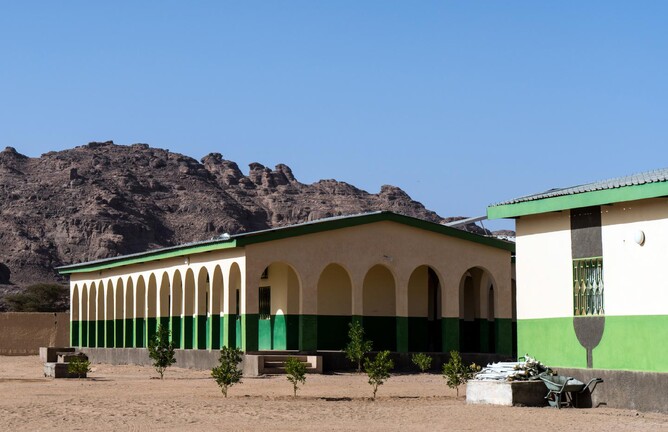The hospital in Bardai is impressive, well equipped and bizarrely, for a hospital in Africa—empty! Inside the spacious walled compound the cream and green-trimmed buildings are well laid out but there are no inpatients on most days. If you searched all the buildings, you’d find only a few hospital staff with little to do. After years of neglect, with equipment gathering dust, this shell of a hospital had few vital signs until recently—when two experienced British doctors arrived, ready to roll up their sleeves and bring it to life.
British doctors Andrea Hotchkins, an Obstetrician and Gynaecologist, and her surgeon husband Mark, walk around the Bardai hospital where they will be working for the next few years. The couple has taken on the task of transforming a barely-working health clinic into a functioning hospital. Built by the government in 2011, the hospital had seen few patients, high quality equipment gathered dust and no doctor had ever performed a surgery until the Hotchkins arrived at the beginning of 2017.
How did this all come about? Another missionary couple, Mark Ortman and his wife Sheryl, have lived and worked in Chad for 25 years, based mostly among the Teda, a proud, free-thinking non-Arab Muslim people group who live in an area that includes southern Libya, northwestern Chad, and northeastern Niger.
"Back in 2013,” Mark tells, “the governor of the Tibesti asked if I could find any missionary doctors to man the Bardai Hospital.” It was an unusual request, but missionaries to this region have proven to be people who bring good to the community—and they stay!
The hospital was built in 2011 as part of a development effort by the president of Chad. “It was probably the best equipped government hospital in Chad, but there were basically no staff to run it,” Mark explains. “Government doctors assigned here found reasons either not to come or not to stay. Missionary doctors were known to be interested in the welfare of the people they were treating and to be in it for the long-term."
For the first five months, Doctors Andrea and Mark began with an important, non-medical task: learning the Teda language, a daunting endeavor but one that will pay off in building relationships both on the job and among the community. During this time they set aside one day a week to work at the hospital.
“It’s just amazing,” Dr. Andrea describes. “There is so much equipment, but nobody really knows how to use it. There were two operating blocks but no one had ever operated. It was just a complete mess, so we made at least one of them functional. There are things missing. For instance, there are a number of oxygen concentrators but no tubes or things that connect it to the patient.
When the Hotchkins first moved to Bardai in February 2017, they were excited to see what an overland trip through the Sahara would be like. They soon found that it took three days at 14 hours per day, squeezed into a tight space with little legroom. Vehicles often break down in the extreme heat and sand. “Having MAF around just makes a huge difference,” Dr. Andrea explains, “because obviously you can come up in one day. Living in quite an isolated place like this, it’s also nice to know that—because of MAF—you can have a break every five or six months. That’s another huge way MAF helps.”
Following their return to Bardai in mid November 2017, in just a month and a half, the doctors saw more patients than would normally be seen in a year: 35 inpatients, 22 surgeries and, a recently acquired skill, 27 dental patients.
